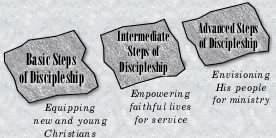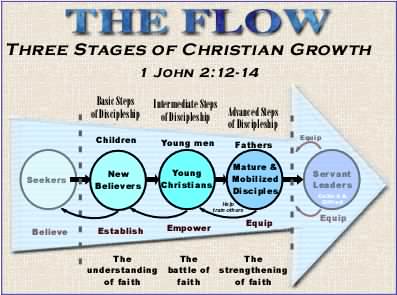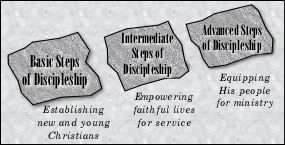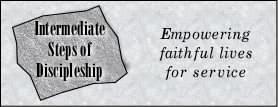
The Three Stages of Spiritual Growth & The Flow
Paul J. Bucknell

Introduction to the Flow Diagram |
|||||||||||||||||||||
The above diagram is a smaller and partially adapted "The Flow" diagram. We have deliberately shaded out the means that people enter this flow of life in Christ (the Seeker stage) and the end stage (the Servant Leader stage). They are important but are best discussed elsewhere. We want to show you, through this diagram, how powerful this growth dynamic adds to your understanding of discipleship. Each of the three stages has its own distinctive features as will be briefly discussed below. Their relationship with each other is what enables us to quickly clarify what has confused Christians for many years. For example, we see how important discipleship is to each part of the Christian's life. We learn what each Christian should be focusing on in their lives. And perhaps most importantly, it helps us realize that Christians always need to be growing. The FLOW has received its name by the way a river flows. The river gains momentum and carries forth what it has received. As God's people, we need to continue to be replenished day by day in Christ. The Holy Spirit helps us through each stage of the Christian life. One area is not more important than another. Each, however, has its own responsibilities and opportunities to serve. If you would like more information, click on one of the links below. This is only a brief introduction. Other articles on discipleship are at the bottom.
|
|||||||||||||||||||||
The Three Stages of Discipleship |
|||||||||||||||||||||
Christians are designed to grow. Whenever a Christian is stagnant, something is drastically wrong. Each of the three stages of discipleship is developed from 1 John 2:12-14 where John uses human growth to describe the stages of spiritual growth. We could break these down further, but we are happy to retain the three categories that John utilizes: infant/child, young man and father. John's own words tell us that each stage has its special characteristics. Because the person is going through such a stage, he has special needs and special opportunities to grow. A child and an adult's growth patterns will have similarities. We must not be ignorant of them. Within this general understanding of life principles, however, there are special needs of each group. We know this physically. The infant needs much to be done for her whereas the teenager is learning to live out her life on a whole different context. This is true spiritually too. It is urgent to formally disciple God's people. Jesus commands us to make disciples (Matthew 28:18-20). To disregard His summary of our duty as said in this Great Commission is utter folly. And yet, few Christians are making disciples. Once we understand the importance of discipleship, we need to start thinking of how we disciple God's people. Most pastors think of doing this through a sermon. They are observing the general principles of life. We all should be learning at worship services. God will meet us there, but it is not sufficient. We need to formally disciple others so growth comes easy and enjoyable without much stumbling due to ignorance and hopelessness. |
|||||||||||||||||||||
The Basic Stage of Discipleship |
|||||||||||||||||||||
We have written much more about these basic steps of the early Christian elsewhere. But we want to mention it is the place that immature Christians are watched over and cared for by right teaching and modeling. My wife is planting seeds in the garden. So we cover them. We also pay much more attention to watering at this stage because the soil at the top gets dry and the roots haven't reached far down. In the same way, we watch over a new Christian. BFF basic discipleship materials provide this type of care. By caring for their questions of assurance and providing good basic teaching about Christ and salvation, the 'infant' Christian can in a short time of three months grow into the Intermediate Stage of Discipleship. |
|||||||||||||||||||||
The Intermediate Stage of Discipleship |
|||||||||||||||||||||
This Intermediate Stage of Discipleship is also a temporary stage. We learn this through John's teaching model. No young person stays young for long. They grow up. Each young person goes through a series of physical and emotional changes that challenge his values in life. He wonders who he is, what he wants to do and how he is going to do it. If he avoids these questions, he gains an adult body with an immature personality. Healthy training can bring all the growth these people need at this stage. Growth needs to occur in many areas of his or her spiritual life. The most appropriate training really depends on where one is at in their life. What do they know of God's Word? Are they married? What sins do they struggle with? Once these questions are answered, they need to start seeing how God's Word helps them grow in those areas. BFF materials are designed to foster that growth. As they grow in the knowledge of God's Word, they can overcome all sorts of former problems and become more like Christ step by step. It is here at this intermediate stage that a lot of rough spots are taken off the Christian. As they are removed, the Christian's faith grows. The Advanced Stage of Discipleship naturally follows the Intermediate.
|
|||||||||||||||||||||
The Advanced Stage of Discipleship |
|||||||||||||||||||||
The Advanced Stage of Discipleship is where the mature Christian is refined over a longer period of time. John compares them to the father. The father is mature. He is a leader and works with other younger ones so that they can be protected, guided and properly cared for. These spiritual fathers have a constant need for growth. Except one will not see much of it from the outward. Their spiritual roots are growing very deep as they come to know God more. The father is the one who bears children. The mature Christian should bear fruit. This fruit will show itself in several areas of life: more Christ-likeness, serving others to help them grow, use of their spiritual gifts to equip the body of Christ and general overseer tasks of protection from cults, leadership decisions and help to those needing comfort. The fathers have been there. They have experienced trials and are best at comforting others. BFF has a lot of training material for those in the Advanced Stage of Discipleship. Because of lack of clarity and challenge, many men and women drift at this stage when they should be bearing much fruit. SummaryWith this brief overview, we hope that you will explore both the many discipleship pages devoted to expanding these ideas as well as introducing free discipleship materials at all three levels ready to be used. If you would like, explore our BFF Discipleship Training Library that has these many articles and discipleship training series on one Library in our resource center.
|
|||||||||||||||||||||
info@foundationsforfreedom.net
Scriptures typically quoted from the New American Standard Bible unless noted:
(C) Copyright The Lockman Foundation 1988
















